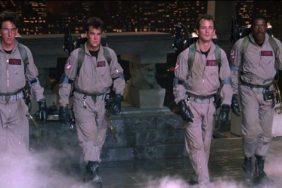Photo: Paramount Pictures
Let’s be completely candid here: If you’re making an American movie and want it to do well, the safe bet might be to cast as many likable Caucasians as you can, right? The irony with so many of the whitewashed movies of American cinema is that their blatant disregard for ethnicity and authenticity in casting causes a lot of uproar amongst the average moviegoer.
Ghost in the Shell, a sexy anime adaptation bringing Scarlett Johansson back on the big screen, is just one of many popular films to whitewash its characters by bringing in white American actors to represent people of other cultures. But it’s not just Asian culture that takes a shot, as Mexican, African American and Indian roles are consistently getting reworked by white actors.
While directors from the days of Breakfast at Tiffany’s might haven’t had the luxury to correctly cast the roles as easily, today seems to be a different case, and people aren’t afraid to voice their disagreements with several recent hit films and their poor casting.
‘Ghost in the Shell’ Is Just One of Many Popular Films Soaked With Whitewashed Characters
Now watch us show off another hot girl: Kate Quigley Is Our Favorite Hot New Sexy Comedian.
Whitewash Movies
-
"Ghost in the Shell" (2017)

Scarlett Johansson's recent portrayal as Major Mira Killian has raised a lot of whitewashing talk. However, Ghost in the Shell, albeit popular Japanese anime, was brought to life with white Americans cast in its lead positions, including Michael Pitt (New Jersey) and Juliette Binoche (Paris).
-
"Aloha" (2015)

Cameron Crowe's Hawaiian culture film features Emma Stone opposite Bradley Cooper. Her role is that of a woman of Chinese-Hawaiian descent, but then again she has an Oscar so she can do as she pleases.
-
"Breakfast at Tiffany's" (1961)

Photo: Paramount Pictures
The Aubrey Hepburn classic may be more than a century old, but, even to this day, Mickey Rooney's appalling portrayal of the angry Japanese neighbor, Mr. Yunoshi, is still considered one of the most blatant racist portrayals in film history.
-
"Argo" (2012)

Ben Affleck gave us a strong yet still whitewashed role play of an American-Mexican in the award-winning film he also directed. Perhaps he just wanted to be in the film, or maybe he was trying to convince us he wasn't Irish American that's been in nearly every Boston-based movie of the last 20 years.
-
"Short Circuit" (1986)

Even Short Circuit is guilty, for crying out loud! Fisher Stevens is a pretty lovable actor, but the makeup and laughable portrayal of an Indian in the runaway robot classic leaves us wondering, What the hell were they thinking? I mean, come on, the guy's from Chicago.
-
"Dragonball: Evolution" (2009)

Photo: 20th Century Fox
What girl (or guy for that matter) doesn't love that hunky Justin Chatwin? However, his lead role in the live action adaptation of the Japanese anime as Goku was so white, along with his Showtime sidekick, Emmy Rossum, as Bulma. It helps a little he nailed the hair, but still.
-
"Doctor Strange" (2016)

Photo: Walt Disney Studios
Asian actors were up in arms over Tilda Swinton's casting as The Ancient One in Marvel's latest feature in late 2016. While Marvel has been dubbed as a progressive superhero entity, Swinton's portrayal is blatant whitewashing. Perhaps Marvel feels it's time to be progressive for white folks, too.
-
"Stuck" (2007)

Photo: Image Entertainment
Prior to seeing this film, no girl was whiter in our mind than Mena Suvari. Perhaps it was a challenge for her to sport cornrows in the overtly African American film, or maybe that was the director's responsibility to not further any stereotypes, although removing race from the equation sort of stung the point of this true story adaptation.
-
"The Prince of Persia: Sands of Time" (2010)

Photo: Walt Disney Studios
We can't decide which was more disappointing: the movie or the studios's decision to whitewash the hell out of a movie about a persian prince by using a Swedish stud in Jake Gyllenhaal.
-
"The Last Airbender" (2010)

M. Night Shyamalan has given us a lot of reasons to avoid his movies, but whitewashing wasn't one of them until his "Airbender" that slapped some fans across the face. However, the director himself says the faces of the anime are ambiguous and that he had no agenda. While creative interpretation is always appreciated, anime is a Japanese art form that typically draws from Asian culture.









